The worst conditions to apply new bandages on my ankles wounds are brought together this morning: sitting on a stone, holding my feet, I must fight with the chicken that try to jump into my room and scare away the pigs that are freely roaming in the village. And I must be quick enough between the application of betadine and the strapping of the compresses (with the Chinese tape that is not that easy to cut) so that the numerous flies don’t have time to land on my open wounds.
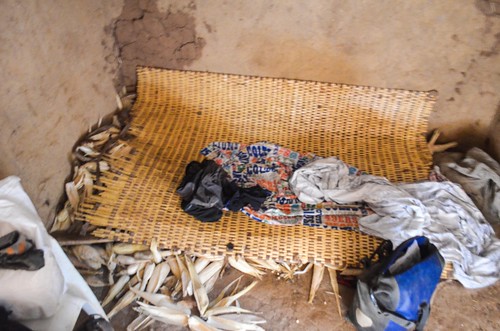
I had a bad night, experiencing my first real diarrhea since the beginning of the trip. I must have drank a quite dirty water yesterday, even if I treated most of it. There is no point running to the bathroom, as there are no toilets in the village. Or, the toilets are everywhere, in the whole surrounding bush.

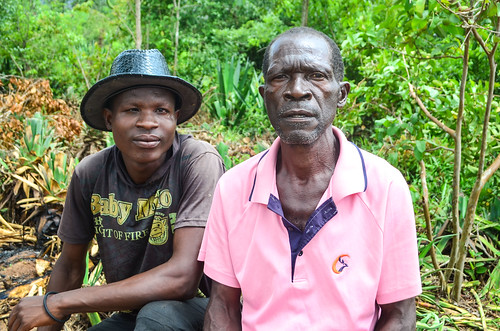
To continue on the road further south to Cubal, I must pass through Bocoio. The dirt track ends up in this small town after a nice but stony downhill. Bocoio also marks the come-back of the 3G signal.


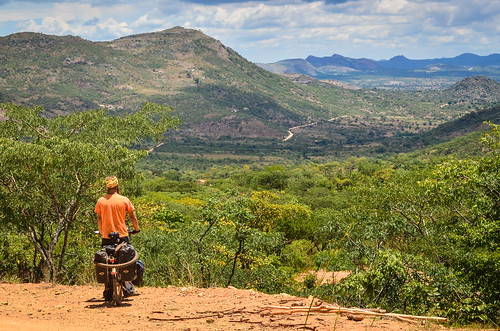
I was a bit dubious about this road to Cubal. It appears only on one of my three maps. Once I am about to engage on it, I ask the villagers of Bocoio how good it is until Cubal. “The road doesn’t pass. There is no bridge“. No bridge … it is down and hasn’t been repaired. Okay, it’s better to know it now rather than in 30 kilometers. “But it’s quite dry, don’t you think I can cross the river carrying my bicycle?“. “No, it’s raining a lot over there“. After 100+ km of dirt roads until today, I am not so much in a mood for unreliable roads. The safe option to Cubal (with a real bridge) is through Balombo and Ganta, a 250 km detour instead of the 100 km straight road.
Since the way to Balombo is asphalted and marked as scenic, I am not so annoyed. But the rain starts as soon as I leave Bocoio. I don’t know if it comes from the coast alongside with the wind, or from the mountains I am heading up to. I keep riding for five kilometers only to realize the rain is getting stronger. The first building I stop at is a bar, and the owner (policeman during weekdays) let me sleep under the veranda, also acting as a rudimentary dance floor. The rain won’t stop.
I am exhausted and am falling asleep on my chair, however the generator is still on: it is useful to charge my devices, but it also means the music playing is attracting customers from the small village across the road. They come to drink and dance. I have to wait for the last one to leave to be able to sleep. Young girls show up, each with a baby on her back, wrapped around her waist. As they shake their bodies, the babies’ heads will bounce … how uncomfortable for a baby sleep at 10 pm … but that’s how it is. No wonder the adults have no consideration for each other’s sleep (including mine) if they were raised and trained this way …
The scenic attraction of the Bocoio-Balombo segment, part of the Huambo-Lobito road, is the large round hills and the huge stones popping out of the ground. Angola is so beautiful and so diverse in its landscape. Before, I had no idea what the country would look like, and I guess few people in the world have. I was imagining an uninteresting land, flat, dry and bushy, bridging the Central African rain forests with a semi-arid climate similar to the interior of Senegal. And I was completely wrong. Angola is stunning almost everywhere.
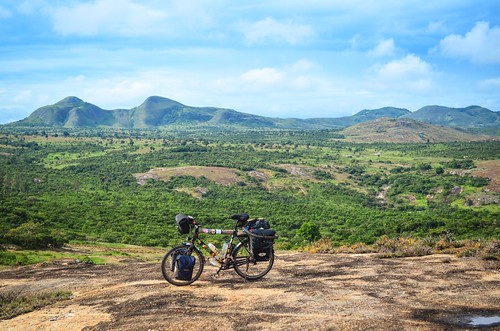

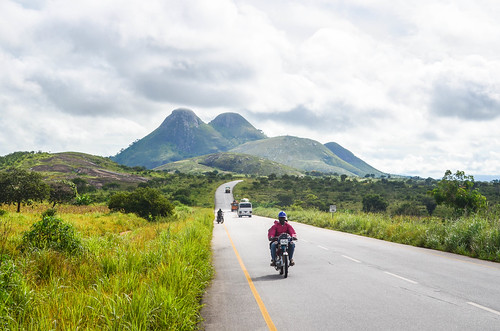
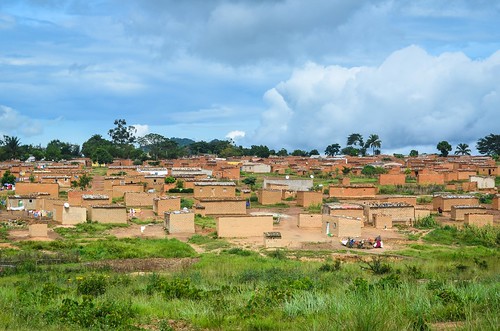

There are few villages on the road, and each time, I miss the opportunity to buy something to nibble on. I become really hungry, and that’s when I am lucky to enter a pineapple producing area: they are sold directly on the road. Women sit behind large plastic buckets filled with fruits. There are seven, eight pineapples per bucket.
How much is it? 3 USD for a bucket of large ones and 1 USD for a bucket of small ones. What if I just want to eat one pineapple? No, it’s not possible. It’s impossible to explain to the lady that I just want one. The prices are fixed and are for buckets. I can’t carry so many pineapples on my bike, a bucket would hardly fit into a 30 L backpack.
It’s not everyday that I find pineapples, so let’s do it: I end up sitting in the shade with my own bucket, and it becomes an all-you-can-eat session. I eat pineapples until I am full, and beyond. With the poor nights I had lately, I almost instantly fall asleep.
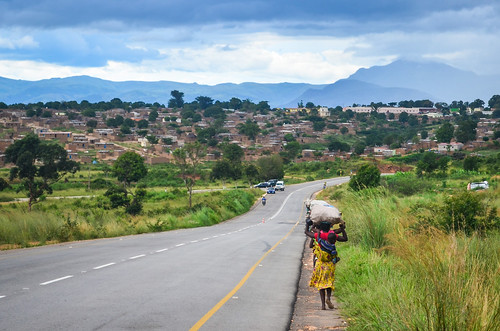
The rain starts at the same time as yesterday. Fortunately, I am in town and can wait in a shop. I get a can of corossol (soursop) juice, made in Vietnam, just like the ubiquitous condensed milk. The only chocolate available is Cadbury. It is a strange choice of imports, far from being the cheapest. I already experienced in Gabon and Congo, similar countries in the way that very little is produced locally, that most of the food in small shop is imported. But there, the cheap products from Turkey, India, UAE were predominant. In Angola, it seems everything has to be costly.
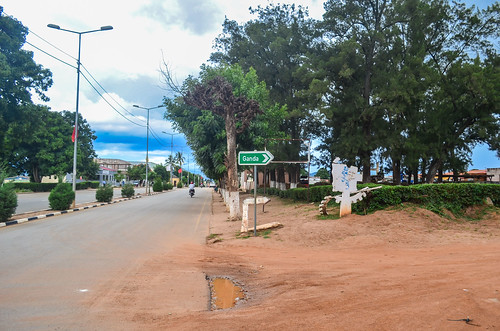
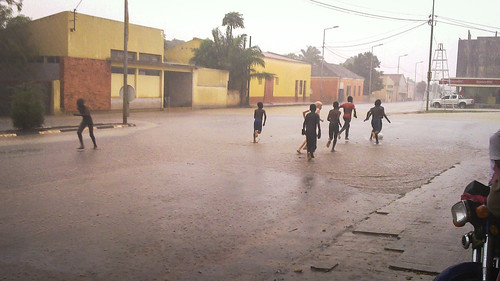
Apparently, in this valley, it rains every day at 3 pm. And quite heavily. It is strange since it is rather dry just 100 km in the north. The rain won’t stop, the end of the day approaches, so I am compelled to sleep in Balombo. A few cycling rounds and I visit the catholic mission where the mass starts. I am invited to stay with Augusto and the seminarians, and Nelson, 19, the best English speaker I have met so far in Angola. As I rarely stay with educated people, I really enjoy having interesting conversations this time.
Augusto takes me to the hot springs in the morning. I didn’t know there were hot springs here, and it is written nowhere. Popular ones are found near Huambo, 200 km out of my way, and in spite of my great attraction for wild hot springs, I didn’t want to make such a detour. As a result I was happily surprised to learn yesterday about the kotakota hot springs, at a walking distance from Balombo.
Kotakota simply means “it’s hot”. As we walk there with Augusto and Nelson, a police car stops by us. And two policemen start asking questions to my hosts about me. Again … I must have really bad luck with the Angolan police, because these ones are not even locals, they are superiors from Benguela doing a routine visit. They force us to return to town immediately, make photocopies of my passport, and signal myself at the police station. Augusto is also warned that he can’t have visitors without declaring them.
I think I have been forced to report to the local police station at least every three days since I entered Angola. The paranoia about foreigners is not only directed at me, since I heard that when the sisters of the convent in Balombo travel to Luanda by public transport, they are arrested up to four times. And they have been living here for years.
We finally get to the hotsprings, which are undertaking renovation works. For this reason, they are closed, but I can bath a bit in the canal at the output of the concrete pipe.

It cannot really be called a nice outdoor hot spring moment, but the water is very good and very hot, maybe it will heal my ankle wounds.
I leave Balombo at 3 pm and expect the rain to catch up with me very soon. Luckily it doesn’t, the clouds leave me enjoy the scenic dirt road going as high as 1750 m on the way to Ganda.

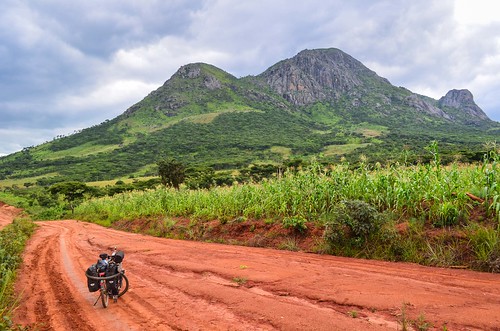

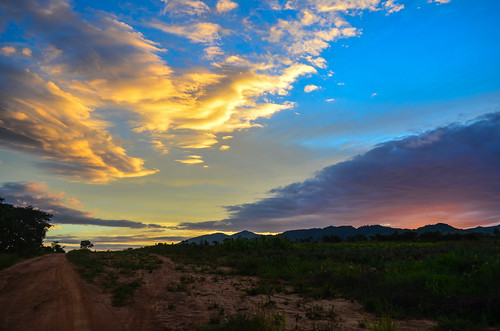
After a small 40 km for my short cycling day, I reach just at night the largest village of the road, simply called “o centro”, to ask the soba for a place to stay. The small shop 5 km earlier, where I stopped for a coca-cola, was managed by a relative. “Just ask for the soba when you arrive in the centro”, he said.
However, the crowd on the main “square” laughs when I show up. They are just watching me, with their beers, and just laugh instead of replying to my questions. If I venture in between the mud houses to look for someone who can tell me where the soba is, the villagers run away and hide into their houses. It is quite unwelcoming and primitive.
Even if it is night already, and too dark to get back on the saddle, I prefer sleeping alone rather than with spiteful, uninteresting or scared people. Three kilometers later and a bit of flashlight-wandering in the corn fields, I find myself a hut and put my tent nearby. The ashes in the hut are still warm and I can restore the fire for my dinner spaghetti. Spaghetti and cassava, my travel diet.
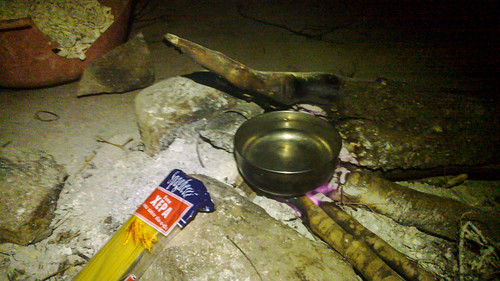
Lucky that the clouds and wind didn’t pour rain over me during the night, the new day is looking promising. One more time, I wake up in the corn fields that seem to cover up the majority of the arable land of Angola.
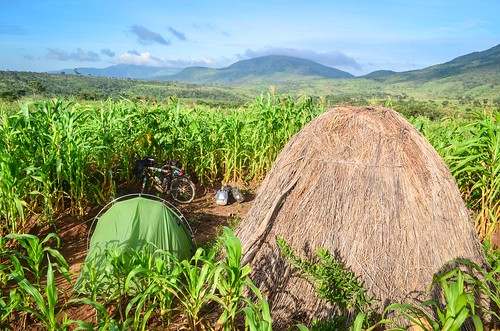
I carry my panniers two by two along the too narrow path back to the dirt road. Just there, a young woman is walking with a large package on her head. Nothing unusual. But when she sees the beardy man making his way out of tall corn plants with two fancy blue bags, something that she probably least expects here, she can’t help letting out a terrible scream. It could have been just like there. She drops her package and runs away, still screaming very loud. I would do the same if I ever wake up with a crocodile in my tent, but here, she just saw someone new in the corn fields. I hear her screaming even after she got out of sight.
When I finish carrying my gear out to the road, she comes back, quiet but still apprehensive, surrounded by her family, escorting her to investigate the reasons of the presence of a monster haunting the village fields. I am used to involuntarily scare some children, but not with such a primal horror scream. And it never worked on adults until now.
One could imagine that a White cyclist camping in the bush of the African countryside should be scared to be found by locals, often walking in group with machetes. I can say it is actually the total opposite.

The long 10 kilometer downhill that follows is pleasant but tricky. The track has obviously been enlarged to prepare the paving, but the rain made it bad already, it is full of ruts. I stop at a small bridge, newly built, to eat a quick brunch. The products I have, simple vaca-que-ri, chouriço (vache-qui-rit cheese and chorizo) and bread buns, announce already an improvement of my diet. The small packs of 2 chouriços imported from Portugal are sold in every small countryside shop.

While I am eating and sunburning, I can see, uphill, a group of ladies walking on the road, coming down towards me. They carry yellow tanks on their heads, and are probably on their way to the river to fetch water. A hundred meter before reaching my bridge, they notice me and make a U-turn. They come back a few minutes later with a delegation from their village, accompanied by men. And the whole group keep observing me from afar.
I guess they are wondering what I am doing here and are scared to proceed to the river as long as I am here. Some kids dare making small steps ahead of their parents. I thus pull out my devilish futuristic instrument manufactured by Nikon, that one that captures the soul of people. And they run away at its sight. Really scared. The seminarians in Balombo had warned me that some of the locals on this road have never seen White people. The sisters reported that when they walk up the hills to provide health care to very remote rural communities, the elderly would touch their white skin, intrigued.

Then, they come back again. Still maintaining a safe distance. I pull out my camera one more time, and they run away again. The game lasts for a while until a smiling man finally comes on his motorbike to greet me. I ask him, “Have they never seen White people before?“.
“- Hahaha, yes of course they have. You see the containers over there? It is a Chinese camp. They have been building this bridge.
– So why are they observing me like an alien?
– They think they saw Jesus Christ! Hahaha.”
Now I know how apparitions used to work. There is an old church near Luanda built on the location of a Marian apparition. We are in 2014, but what if a church is built here, featuring paintings of Jesus riding a bicycle?

The dirt road gets nicer and nicer until Ganda. I find a friend to play with:
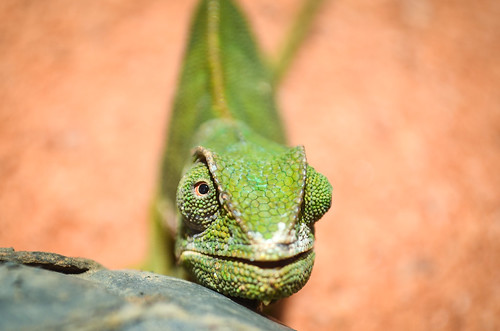
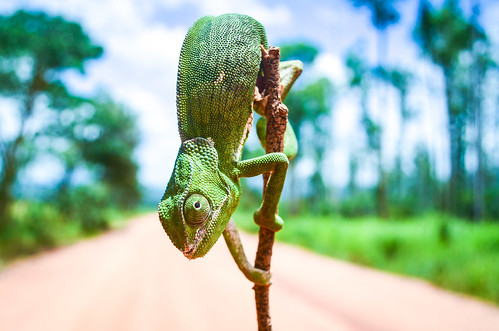

As usual, all the chameleons I find are always broken: they never change color.
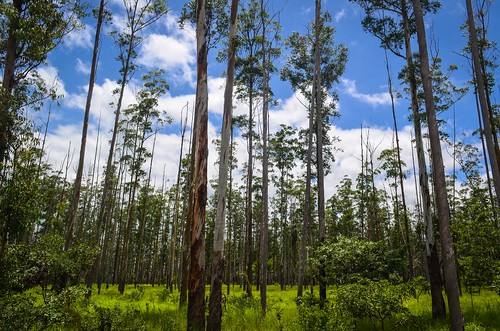

As usual also, the motorbikers, so many of them as it is the predominant way of transport, make U-turns when they pass me, so that they can pass me again twice. Just to watch me. They are as annoying as the flies around my head.
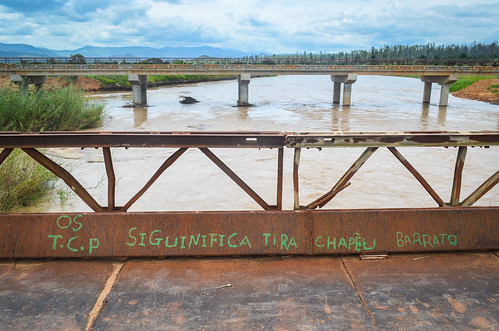


I change my route plan: the original plan was to reach Cubal and then Chongoroi, but these roads don’t appear on all my maps and are not known by the locals. As it is likely to be an old road with unmaintained bridges, I continue on the safe dirt road until Caluquembe.

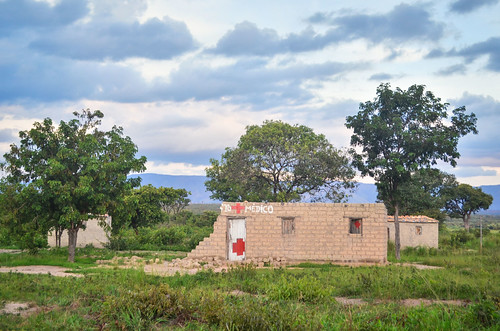
There is no electricity along this road, yet a loud bass is reverberating in the trees. Generators in the bush are always used to play music and to charge phones. It is also time for me to look for a camping spot. As I am about to pass a fence to enter a fazenda, a farming estate, drunk Javier passes here with his motorbike. “What are you doing here? I am the manager“. Bad luck? No, I say I just want to sleep and he suggests we cook together and sleep in the fazenda building. Good luck!
Javier is quite drunk, but says he will switch on the generator, while he gives me way too many raw peanuts and sets up a fire to cook funge. He keeps walking around, forgetting what he was about to do. My patience with him repeating every minute that he is “the only gerante of the fazenda” is diminishing. Practically every man who can afford it will be drunk every day.
After one hour in there, the generator is still not working and it is unlikely we will eat soon. The house is fully equipped with a kitchen and a bathroom, both “not working“. The fridge is empty and smelly. The whole place is very dirty. Javier is staying there, but does nothing to live in decent condition. It could look good though. Instead, he lives with a flashlight and cooks with firewood, just like people in the bush who have no access to all this comfort. I understand he is just the caretaker for the fazenda owner who lives in Benguela. It’s sad to witness all that infrastructure, built or given by the wealthiest to the poorer, just not maintained, and soon falling into disrepair.
On a higher level, I had a conversation with someone advocating for the end of foreign aid. “Foreign aid plays against the development of African countries“. Not because a major chunk of it is looted by the countries’ corrupt elites and reinvested abroad or hidden in bank accounts, but because it creates helpless and dependent behaviors. I’d say it is a human trait to care less about things we didn’t buy or build ourselves, than about things we worked hard for. The public tap is broken? The asphalt of the road is eaten by potholes? The school is falling apart? No worries, we’ll do without until someone else builds a new one. I can see that on a small scale every day.
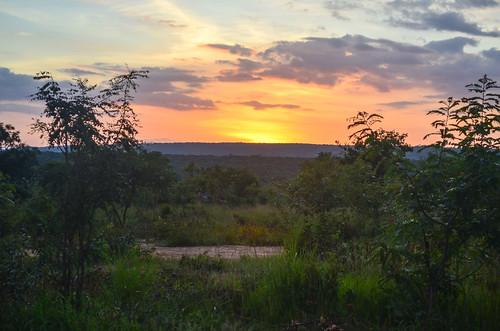
“Javier will eventually sober up and things will go alright”, I have been thinking. He is unmanageable, and despite his trying to be friendly, I am not having a good time and doubt that I will be able to sleep well.
Then arrives another young man working here. “Good, I won’t be alone with the drunk one” comes to my mind, for a minute only. This young man cannot repair the generator, is speaking not friendly, has a whiskey bottle in his hand and another one in the pocket … alcohol as a solution to all problems. Time for me to leave!
These days, I have no luck with Angolans. Lack of education and the large alcohol consumption are significant responsible. I cycle back to where I had spotted a potential camp spot at the end of a narrow path, and spend another wonderful night under the stars.





oups, tes récits sur l’Angola ont un côté déprimant mais j’aime bcp ton statement: “One could imagine that a White cyclist camping in the bush of the African countryside should be scared to be found by locals, often walking in group with machetes. I can say it is actually the total opposite.”
Contente de te savoir entier et en bonne voie d’achever ton périple !
Curieuse de lire tes prochaines étapes et rencontres, en te souhaitant des échanges intéressants dans les derniers pays sur ta route !
Bises de Lausanne
Thank you. Another wonderful post, JB! Interesting thoughts about development aid.
You are much in our minds. Hope all goes well as you cycle south.
Thanks Vesey